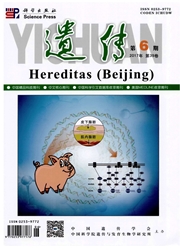

 中文摘要:
中文摘要:
REV3编码DNA聚合酶ζ催化亚基,参与DNA跨损伤修复在HCT116(p53^**/**)中,抑制REV3诱导DNA持续性损伤以及细胞阻滞于G1期,而在HCT116(p53^-/-)中,上述现象并未出现,证明p53在抑制REV3产生的应答反应中扮演重要角色;另外,REV3与pS3均可被DNA损伤激活参与DNA损伤应答,提示抑制REV3对p53表达及细胞生长的影响是通过DNA损伤介导的,那么抑制p53同样会影响REV3表达及细胞生长.我们以人高分化结肠癌细胞系-THC-8307为研究对象,通过siRNA抑制癌细胞中REV3和p53,由此探讨两基因间的相互影响,发现抑制REV3时,癌细胞早期凋亡和晚期凋亡均明显增加,p53mRNA表达量增高,G1期细胞数量显著增加;抑制p53对癌细胞凋亡无明显影响,S期细胞数量增加,REV3mRNA表达增高;同时抑制REV3-p53时,癌细胞凋亡无明显变化,G2期细胞数量增加.以上结果表明REV3和p53在调控结肠癌细胞凋亡和生长阻滞过程中具有一定的相互影响.
 英文摘要:
英文摘要:
REV3 encodes a catalytic subunit of DNA polymerase ; required for translesion DNA synthesis. The inhibition of REV3 expression induces persistent DNA damage and growth arrest in the G1 phase, which is initiated by p53 activation. We speculated thatp53 plays a critical role in regulating apoptosis and cell growth through inhibition of REV3. In this study, we found that experimental suppression of REV3 induced apoptosis and arrested colon cancer at the G1 phase. Surprisingly, suppression of p53 promoted REV3 expression and the accumulation of S-phase cells, suggesting that excessive REV3 activity interferes with replicative DNA synthesis. The above observations collectively reveal genetic interactions between REV3 andp53 in the regulation of apoptosis and cell growth in colon cancer cells.
 同期刊论文项目
同期刊论文项目
 同项目期刊论文
同项目期刊论文
 期刊信息
期刊信息
